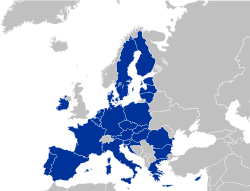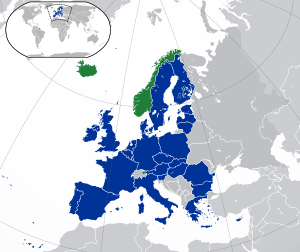Enhanced cooperation
In the European Union (EU), enhanced cooperation is a procedure where a minimum of nine EU member states are allowed to establish advanced integration or cooperation in an area within EU structures but without the other members being involved.[1] As of October 2017, this procedure is being used in the fields of divorce law,[2] patents,[3][4] property regimes of international couples, and European Public Prosecutor and is approved for the field of a financial transaction tax.[5]
This is distinct from the EU opt-out, that is a form of cooperation between EU members within EU structures, where it is allowed for a limited number of states to refrain from participation (e.g. EMU, Schengen Area). It is further distinct from Mechanism for Cooperation and Verification and permanent acquis suspensions, whose lifting is conditional on meeting certain benchmarks by the affected member states.
History
Enhanced cooperation was introduced by the Treaty of Amsterdam for community, judicial cooperation and criminal matters. The Treaty of Nice simplified the mechanism and forbade opposition to the creation of enhanced cooperation. It also introduced cooperation for the Common Foreign and Security Policy, except for defence matters.[6] The Treaty of Lisbon extended cooperation to include defence[6] and additionally envisions the possibility for establishment of a permanent structured cooperation in defence. The provisions governing enhanced cooperation are now detailed in the Treaty on European Union (Article 20) and Treaty on the Functioning of the European Union (Article 326-334).
The Schengen Agreement adoption is considered a historical inspiration for formalising the mechanism of Enhanced cooperation. It was created by European Communities member states only, but outside of its structures, in part owing to the lack of consensus amongst all members over whether it had the competence to abolish border controls,[7] and in part because those ready to implement the idea did not wish to wait for others. As there was no Enhanced cooperation mechanism back then it was impossible to establish it inside the Community structures from the start, but afterwards the Schengen Agreement was subsumed into European Union law by the Treaty of Amsterdam as the rules of the Schengen Area. With its integration into general EU law it was transformed from a precursor Enhanced cooperation into an opt-out.
Usage
Enhanced cooperation allows for a minimum of nine member states (which amounts to almost one-third at the moment) to co-operate within the structures of the EU without all member states. This allows them to move at different speeds, and towards different goals, than those outside the enhanced cooperation area.[6] It is designed to overcome paralysis, where a proposal is blocked by the veto of an individual state or a small group who do not wish to be part of the initiative.[1] It does not however allow for an extension of powers outside those permitted by the treaties of the European Union and is only allowed as a last resort where objectives cannot be achieved normally. It may not discriminate against members, it must further the objectives in the treaties and may not fall within an area which is of exclusive competence of the EU.[6]
The mechanism needs a minimum of nine Member States, who file a request with the European Commission. If the Commission accepts it then it has to be approved by a qualified majority of all member states to proceed.[1] A member may not veto the establishment of enhanced cooperation except for foreign policy.[8]
Currently in force
Applicable law to divorce (Rome III)
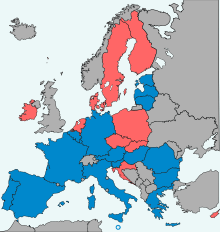
With the rise in cross border divorce in the EU, common rules were put forward to settle the issue of under which law trans-national couples can divorce in the EU. However, Sweden blocked the new rules, fearing the loss of its liberal divorce law (divorce law differs strongly, with Nordic liberalism with relatively "easy" procedures, being in contrast to more conservative countries such as Malta which has only recently permitted it). To allow those willing states to proceed without Sweden, in July 2008 nine countries put forward a proposal to use enhanced cooperation: Austria, France, Greece, Hungary, Italy, Luxembourg, Romania, Slovenia and Spain. Belgium, Germany, Lithuania and Portugal were considering joining them.[9]
At a meeting of the justice ministers on 25 July 2008, the nine states decided to formally seek the measure of enhanced cooperation; eight states (the nine states above minus France) formally requested it from the European Commission on 28 July 2008.[9][10] On 24 March 2010, when the law was formally proposed by the commission, Bulgaria was the tenth state to join the aforementioned eight and France.[11] Belgium, Germany and Latvia formally joined them on 28 May 2010, while Greece withdrew.[12][13]
MEPs backed the proposal in June 2010[13] with fourteen states willing to adopt the proposed cooperation: Austria, Belgium, Bulgaria, France, Germany, Hungary, Italy, Latvia, Luxembourg, Malta, Portugal, Romania, Slovenia and Spain.[14] These states were then authorised by the Council to proceed with enhanced cooperation on 12 July 2010.[15][16] Following the adoption of Council Regulation (EU) No 1259/2010 on 20 December 2010, also known as the Rome III Regulation,[17] came into force in the 14 participating states on 21 June 2012.[2] Other EU Member state are permitted to sign up to the pact at a later date. Lithuania became the first state to join the agreement when they were approved by the Commission on 21 November 2012.[18] The provisions of the agreement applied to Lithuania as of 22 May 2014.[18] Greece's participation was approved by the Commission on 27 January 2014, making them the 16th country to join the regulation, which applied to it as of 29 July 2015.[19][20] Estonia's participation was approved by the Commission in August 2016, and the regulation applied to the country as of 11 February 2018.[21][22]
Unitary patent
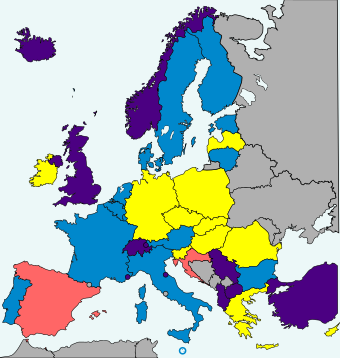
(unitary patents will only apply for these states)
(unitary patents will not apply for these states)
(eligible for participation in the future)
The unitary patent, formally a "European patent with unitary effect", is the second case of enhanced cooperation adopted by the European Commission and Parliament.[23] 26 Member States, all except Spain and Croatia (which acceded to the EU following the unitary patents adoption), participate in the unitary patent. Towards the end of 2010, twelve states[24] proposed enhanced cooperation to work around disagreements with Italy and Spain over what languages a European patent would be translated into. The unitary patent would be examined and granted in one of the existing official languages of the European Patent Office – English, French or German. Following the Commission approval of the plan on 14 December 2010, the Council of the European Union requested the European Parliament's consent to use of enhanced cooperation for a unitary patent on 14 February 2011 with the participation of 25 member states (all but Italy and Spain).[25] The Parliament approved it the next day and the Council authorised enhanced cooperation on 10 March 2011.[26] On 13 April 2011 the Commission adopted a proposal for a Council Regulation implementing enhanced cooperation.[27] During the European Council of 28–29 June 2012, agreement was reached on the provisions between the 25 member states and the necessary EU-legislation was approved by the European Parliament on 11 December 2012.[28] Following a request by the government of Italy,[29] it became a participant of the unitary patent regulations in September 2015.[30]
The enhanced cooperation measures entered into force in January 2013, and will apply to a participating member states from the date when the related Agreement on a Unified Patent Court enters into force for the state. The UPC agreement has been signed by 25 EU member states, including all states participating in the enhanced cooperation measures except Poland; while Italy, on the other hand, signed the UPC agreement prior to joining the enhanced cooperation measures for a unitary patent.[31][32] Poland decided to wait to see how the new patent system works before joining due to concerns that it would harm their economy.[33] Entry into force of the UPC will take place for the first group of ratifiers on the first day of the fourth month after at least 13 states (including Germany, France and the United Kingdom as the three states with the most European patents in force) have ratified the UPC agreement.[28][31][34][35][36]
Property regimes of international couples
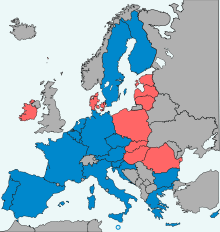
In June 2016, the Council of the European Union authorised 18 Member States of the European Union to initiate an enhanced cooperation in the area of jurisdiction, applicable law and the recognition and enforcement of decisions on the property regimes of international couples, covering both matters of matrimonial property regimes and the property consequences of registered partnership.[37] Later that month, enhanced cooperation was implemented through Regulations EU 2016/1103 for married couples[38] and EU 2016/1104 for registered partnerships,[39] both of which will fully apply from 29 January 2019.
European Public Prosecutor
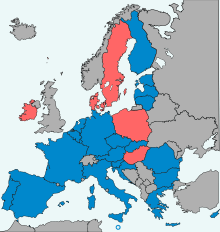
The European Public Prosecutor's Office (EPPO) is an independent body of the European Union (EU) to be established under the Treaty of Lisbon between 20 of the 28 members of the EU.[40] It will be based in Luxembourg alongside the European Court of Justice and the European Court of Auditors. The role of the EPPO is to investigate and prosecute fraud against the EU budget and other crimes against the EU's financial interests including fraud concerning EU funds of over €10,000 and cross-border VAT fraud cases involving damages above €10 million. Previously only national authorities could investigate and prosecute these crimes and could not act beyond their borders.
The European Commission proposed a regulation for the establishment of the EPPO on 17 July 2013.[41][42] After no consensus could be reached among all EU member states, the states which wished to participate notified the European Parliament, the Council and the Commission on 3 April 2017 that they would proceed with establishing the EPPO by the use of enhanced cooperation.[43] This was done under TFEU Article 86, which allows for a simplified enhanced cooperation procedure which does not require authorization from the Council to proceed. The participating member states agreed on the legislative text to establish the EPPO on 8 June.[44] On 12 October 2017 the regulation was given final approval by the 20 participating states.[45][46] The EPPO will not have authority to begin investigating or prosecuting crimes until a decision of Commission approves this, which per the terms of the Regulation cannot take place until 3 years after the entry into force of the Regulation in November 2017.[45]
The Netherlands officially requested to join EPPO on 14 May 2018,[47][48] which was approved by the Commission on 1 August 2018.[49][50] Malta requested to join on 14 June 2018,[51] and their participation was approved on 7 August 2018.[52][53]
Proposals
Financial transaction tax
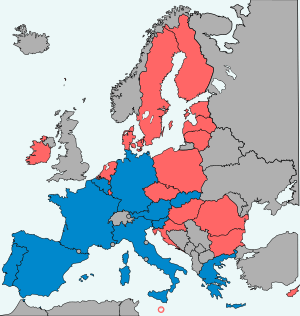
After discussions to establish a European Union financial transaction tax (FTT), which would tax financial transactions between financial institutions, failed to establish unanimous support due objections from the United Kingdom and Sweden, a group of states began pursuing the idea of utilising enhanced cooperation to implement the tax.[54] Nine states (Austria, Belgium, Finland, France, Germany, Greece, Italy, Portugal and Spain) signed a letter in February 2012 requesting that a FTT be implemented.[55] After their parliamentary election in March 2012, Slovakia joined the list of states supporting the FTT.[56] On 16 July 2012, Hungary introduced a unilateral 0.1 percent FTT to be implemented in January 2013.[57] In October 2012, after discussions failed to establish unanimous support for an EU-wide FTT, the European Commission proposed that the use of enhanced cooperation should be permitted to implement the tax in the states which wished to participate.[58][59] The proposal, supported by 11 EU member states (Austria, Belgium, Estonia, France, Germany, Greece, Italy, Portugal, Slovakia, Slovenia and Spain), was approved in the European Parliament in December 2012[60] and the Council in January 2013.[5] On 14 February, the European Commission put forward a revised proposal for the details of the FTT to be enacted under enhanced cooperation.[61] The proposal was approved by the European Parliament in July 2013,[62] and must now be unanimously approved by the 11 initial participating states before coming into force.[61][63]
The legal service of the Council of the European Union concluded in September 2013, that the European Commission's proposal would not tax "systemic risk" activities but only healthy activities, and that it was incompatible with the EU treaty on several grounds while also being illegal because of "exceeding member states' jurisdiction for taxation under the norms of international customary law".[64] The Financial Transaction Tax can no longer be blocked by the Council of the European Union on legal grounds, but each individual EU member state is still entitled to launch legal complaints against a finally approved FTT to the European Court of Justice, potentially annulling the scheme.[65] On 6 May 2014, ten out of the initial eleven participating member states (all except Slovenia) agreed to seek a "progressive" tax on equities and "some derivatives" by 1 January 2016, and aimed for a final agreement on the details to be negotiated and unanimously agreed upon later in 2014.[66] With negotiations ongoing into 2016, Estonia formally withdrew from the FTT enhanced cooperation procedure on 16 March 2016, leaving 10 participating states.[67]
Other arrangements between European Union members
A number of other agreements between a subset of EU member states to deepen integration have been concluded outside the framework of EU law. Some of these have subsequently been replaced by EU regulations, such as the Brussels Convention and the Rome Convention. The European Commission proposed in July 2015 to also integrate the Euro Plus Pact, European Fiscal Compact and the Single Resolution Fund into EU law by June 2017, while planning for the European Stability Mechanism to make the same transition by 2025.[68]
Permanent Structured Cooperation in Defence
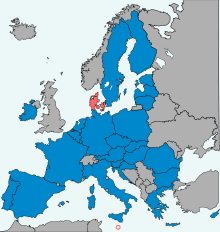
The European Defence Initiative was a proposal for enhanced European Union defence cooperation presented by France, Germany, Belgium and Luxembourg in Brussels on 29 April 2003, before the extension of the coverage of the enhanced cooperation procedure to defence matters. The Treaty of Lisbon added the possibility for "those Member States whose military capabilities fulfill higher criteria and which have made more binding commitments to one another in this area with a view to the most demanding missions [to] establish permanent structured cooperation within the Union framework".[69]
Those states shall notify their intention to the Council and to the High Representative. The Council then adopts, by qualified majority a decision establishing permanent structured cooperation and determining the list of participating Member States. Any other member state, that fulfills the criteria and wishes to participate, can join the PSCD following the same procedure, but in the voting for the decision will participate only the states already part of the PSCD. If a participating state no longer fulfills the criteria a decision suspending its participation is taken by the same procedure as for accepting new participants, but excluding the concerned state from the voting procedure. If a participating state wishes to withdraw from PSCD it just notifies the Council to remove it from the list of participants. All other decisions and recommendations of the Council concerning PSCD issues unrelated to the list of participants are taken by unanimity of the participating states.[69]
The criteria established in the PSCD Protocol are the following:[69]
- co-operate and harmonise requirements and pool resources in the fields related to defence equipment acquisition, research, funding and utilisation, notably the programs and initiatives of the European Defence Agency (e.g. Code of Conduct on Defence Procurement)
- capacity to supply, either at national level or as a component of multinational force groups, targeted combat units for the missions planned, structured at a tactical level as a battle group, with support elements including transport (airlift, sealift) and logistics, within a period of five to 30 days, in particular in response to requests from the United Nations Organization, and which can be sustained for an initial period of 30 days and be extended up to at least 120 days.
- capable of carrying out in the above timeframes the tasks of joint disarmament operations, humanitarian and rescue tasks, military advice and assistance tasks, conflict prevention and peace-keeping tasks, tasks of combat forces in crisis management, including peace-making and post-conflict stabilisation[69]
On 7 September 2017 an agreement was made between EU foreign affairs ministers to move forward with PESCO with 10 initial projects.[70][71][72][73] The agreement was signed on 13 November by 23 of the 28 members states. Ireland and Portugal notified the High Representative and the Council of the European Union of their desire to join PESCO on 7 December 2017.[74] Denmark did not participate as it has an opt-out from the Common Security and Defence Policy, nor did the United Kingdom, which is scheduled to withdraw from the EU in 2019.[75][76] Malta opted-out as well.[77][78]
Open Method of Coordination
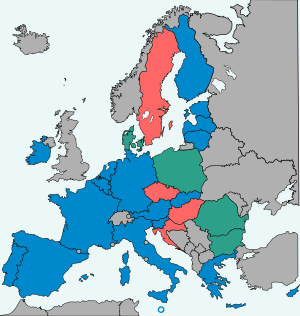
The Open Method of Coordination is a method of governance in the European Union, based on the voluntary cooperation of its member states. The open method rests on soft law mechanisms such as guidelines and indicators, benchmarking and sharing of best practice. This means that there are no official sanctions for laggards. Rather, the method's effectiveness relies on a form of peer pressure and naming and shaming, as no member state wants to be seen as the worst in a given policy area.
Euro Plus Pact
The Euro Plus Pact is an arrangement for cooperating in economic measures adopted on 25 March 2011 by the European Council through the Open Method of Coordination and includes as participants the Eurozone member states, Bulgaria, Denmark, Poland and Romania.[79]
Related intergovernmental treaties
Although not formally part of European Union law, several closely related treaties have been signed outside the framework of the EU and its predecessors between the member states because the EU lacked authority to act in the field. After the EU obtained such autonomy, the conventions were gradually replaced by EU instruments. Examples are the Brussels Convention of 1968[80] (on jurisdiction in civil matters, replaced by the Brussels I Regulation[81]), the Rome Convention on Contractual Obligations of 1980[82] (on choice of law in contractual matters, replaced by the Rome I Regulation except in Denmark[83]), the Dublin Convention of 1990[84] (on asylum seekers, replaced by the Dublin II Regulation[85]) as well as the Europol Convention of 1995[86] (came under the EU's competence with the Lisbon Treaty[87] and replaced by a Council Decision.[88]) Furthermore, several treaties have been concluded between a subset of EU member states due to a lack of unanimity. The Schengen Treaty was agreed to in 1985 in this manner, but was subsequently incorporated into EU law by the Amsterdam Treaty, with the remaining EU member states that had not signed the treaty being given an opt-out from implementing it. More recently, the Prüm Convention and European Fiscal Compact were signed as intergovernmental treaties. However, both state that the intention of the signatories is to incorporate the treaty's provisions into EU structures and that EU law should take precedence over the treaty. As well, both agreements are open to accession by any EU member state. The Treaty Establishing the European Stability Mechanism was also signed and entered into force outside of the EU framework. However, a TFEU amendment was ratified which gives the ESM a legal basis in the EU treaties.
Prüm Convention
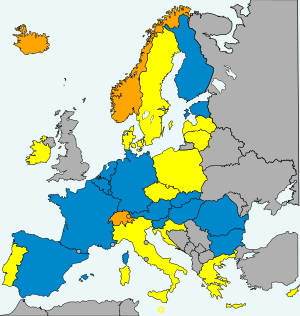
The Prüm Convention, a treaty for cooperation in criminal matters signed on 27 May 2005 by Germany, Spain, France, Luxembourg, Netherlands, Austria, and Belgium, was adopted outside of EU structures, but it asserts European Union law takes precedence over its provisions (if they are incompatible) and that it is open to accession for any member state of the EU. Part of its provisions were later subsumed into European Union law by the Prüm Decision of 2008.
European Stability Mechanism
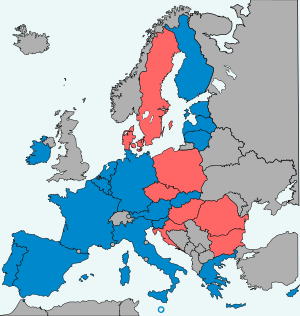
The European Stability Mechanism (ESM) is an intergovernmental organization located in Luxembourg City, which operate under public international law for all eurozone Member States having ratified a special ESM intergovernmental treaty. It was established when the intergovernmental treaty entered into force on 27 September 2012, as a permanent firewall for the eurozone to safeguard and provide instant access to financial assistance programmes for member states of the eurozone in financial difficulty, with a maximum lending capacity of €500 billion. It replaced two earlier temporary EU funding programmes: the European Financial Stability Facility (EFSF) and the European Financial Stabilisation Mechanism (EFSM). All new bailouts of eurozone member states will be covered by ESM, while the EFSF and EFSM will continue to handle money transfers and program monitoring for bailouts previously approved for Ireland, Portugal and Greece. Upon its founding, all 17 eurozone member states ratified the agreement to become ESM members. According to the text of the treaty, the ESM is open to accession by any EU member state once their derogation from using the euro has been lifted by the Council of the European Union. New members must first be approved by the ESM's Board of Governors, after which they would need to ratify to the Treaty Establishing the ESM.[89] After Latvia's adoption of the euro on 1 January 2014 was given final approval by the Economic and Financial Affairs Council on 9 July,[90][91] the ESM Board of Governors approved Latvia's membership application in October 2013.[92] Latvia became the first state to accede to the ESM with formal membership starting on 13 March 2014. Lithuania adopted the euro on 1 January 2015, and acceded to the ESM with formal membership starting on 3 February 2015.[93]
A separate treaty, amending Article 136 of the Treaty on the Functioning of the European Union (TFEU) to authorize the establishment of the ESM under EU law, entered into force on 1 May 2013.[94] In June 2015, an updated EMU reform plan envisaged ESM should be transposed from being an intergovernmental agreement to become fully integrated into EU framework law in the medium-term (between July 2017 and 2025).[68]
European Fiscal Compact
.svg.png)
The European Fiscal Compact is an intergovernmental treaty dealing with fiscal integration that was signed by 25 member states of the European Union (EU) (all except the Czech Republic and the United Kingdom; Croatia subsequently acceded to the EU in July 2013) on 2 March 2012.[95] Although the European Fiscal Compact was negotiated between member states of the EU, it is not formally part of European Union law. It does, however, contain a provision to attempt to incorporate the pact into the Treaties establishing the European Union within 5 years of its entering into force. The treaty entered into force on 1 January 2013 for the 16 states which had completed their ratification.[96] All nine other signatory states subsequently became parties to the treaty.[97] Two non-eurozone member states, Denmark and Romania, have declared their intent to be bound by the fiscal provisions in the treaty (titles III and IV) upon ratification, and Bulgaria declared themselves bound by parts of these provision, while for the remaining non-eurozone states they will only apply from the date they adopt the euro.[97][98] Latvia's adoption of the euro on 1 January 2014 and Lithuania's adoption of the euro on 1 January 2015 made them bound by the fiscal provision.[99] Croatia, which acceded to the EU in July 2013, also acceded to the Fiscal Compact on 7 March 2018, as did the Czech Republic on 3 April 2019.
Unified Patent Court
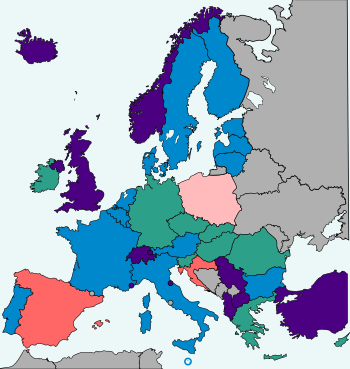
After two regulations utilising enhanced cooperation to establish a European Union patent of unitary effect were approved for 25 participating states (all but Italy, Spain and Croatia, which subsequently acceded to the EU in July 2013) by the European Parliament on 11 December 2012[28][100] the documents were formally adopted as regulation E.U. 1257 and 1260 of 2012 on 17 December 2012, and entered into force in January 2013.[3][4] The provisions will apply once an accompanying Agreement on a Unified Patent Court enters into force. Due to a ruling by the Court of Justice of the European Union that the proposed Unified Patent Court (UPC) was not compatible with European Union law,[101] it was decided that the court would be established by an intergovernmental treaty between the participating states outside the framework of the EU.[102] The Agreement on a Unified Patent Court was published by the Council of the European Union on 11 January 2013,[103] and was signed on 19 February 2013 by 24 EU member states, including all states participating in the enhanced cooperation measures except Bulgaria and Poland, while Italy, which did not originally join the enhanced cooperation measures but subsequently signed up, did sign the UPC agreement.[31][32] The agreement is open for accession to all remaining EU member states, and Bulgaria signed the agreement on 5 March after finalizing their internal procedures.[31][104] Meanwhile, Poland decided to wait to see how the new patent system works before joining due to concerns that it would harm their economy.[33] States which do not participate in the unitary patent regulations can still become parties to the UPC agreement, which would allow the new court to handle European patents validated in the country.[105] Entry into force for the UPC will take place after 13 states (including Germany, France and the United Kingdom as the three states with the most patents in force) have ratified the Patent Court agreement, but not before 1 January 2014.[28][31][34][35][36]
Single Resolution Fund
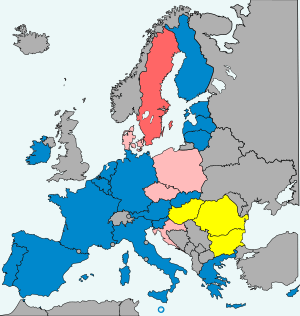
President of the European Central Bank, Mario Draghi, released a report on 26 June 2012 which called for deeper integration in the eurozone, including the establishment of a banking union encompassing direct recapitalisation of banks from the ESM, a common financial supervisor, a common bank resolution scheme and a deposit guarantee fund.[106] The Single Supervisory Mechanism (SSM) was enacted through two regulations in October 2013 to monitor the stability of banks.[107] However, during negotiations for the Single Resolution Mechanism (SRM), which would be responsible for resolving failing banks and would establish a Single Resolution Fund (SRF) to fund their restructuring, concerns, especially by Germany, were raised that some of its provisions were incompatible with current EU treaties.[108][109][110] As a result, the details of some aspects of the functioning of the SRF, including the transfer and mutualisation of funds from national authorities to the centralized fund, was split off from the Regulation to an Intergovernmental Agreement outside the framework of the EU.[108][109][110] However, the treaty states that the intention of the signatories is to incorporate the treaty's provisions into EU structures within 10 years. The agreement was signed by 26 EU member states (all but Sweden and the United Kingdom) and is open to accession to any other EU member states.[108] It entered on 1 January 2016, following the ratification by states representing 90% of the weighted vote of SSM and SRM participating states,[108] but only to SSM and SRM participating states.[108] As of December 2018, all eurozone states, as well as Hungary, Romania, Bulgaria, have ratified the agreement.
Table
| Country | Cooperation agreements amongst a subset of EU member states | |||||||||||
|---|---|---|---|---|---|---|---|---|---|---|---|---|
| Enhanced cooperation | Permanent Structured Cooperation in Defence | Open Method of Coordination | Related intergovernmental treaties | |||||||||
| Applicable Divorce law | Unitary patent | Financial transaction tax | Property regimes of international couples | European Public Prosecutor | Euro Plus | Prüm Convention | European Stability Mechanism | Fiscal Compact | Unified Patent Court | Single Resolution Fund | ||
| P | F | I | P | F | P | P | P | P | P | F | P | |
| P | F | I | P | F | P | P | P | P | P | F | P | |
| P | F | P | F | P | P | P | N/A | D | F | D | ||
| F | P | F | P | P | P | P | S | P | ||||
| P | F | P | N/A | D | S | |||||||
| F | P | F | P | N/A | D | S | S | |||||
| F | P | N/A | P | F | S | |||||||
| P | F | F | P | P | P | P | P | F | P | |||
| F | P | F | P | P | P | P | P | F | P | |||
| P | F | I | P | F | P | P | P | P | P | F | P | |
| P | F | I | P | F | P | P | P | P | P | S | P | |
| P | F | I | P | F | P | P | I | P | P | S | P | |
| P | F | P | P | N/A | D | S | D | |||||
| F | P | P | P | P | S | P | ||||||
| P | F | I | P | F | P | P | I | P | P | F | P | |
| P | F | F | P | P | P | P | F | P | ||||
| P | F | F | P | P | P | P | F | P | ||||
| P | F | P | F | P | P | P | P | P | F | P | ||
| P | F | P | F | I | P | P | P | F | P | |||
| F | P | F | P | P | P | P | P | F | P | |||
| F | P | P | N/A | D | I | S | ||||||
| P | F | I | P | F | P | P | I | P | P | F | P | |
| P | F | F | P | P | P | N/A | P | S | D | |||
| F | I | F | P | P | P | P | P | S | P | |||
| P | F | I | P | F | P | P | P | P | P | S | P | |
| P | I | P | F | P | P | P | P | P | P | |||
| F | P | P | I | N/A | D | F | ||||||
- P — Regulation/Treaty in force
- F — Participation formalized/Treaty ratified, but not in effect
- D — Derogation from full participation
- S — Signed the Treaty
- I — Announced interest in participation
- N/A — Not eligible to become a party as it is not a member of the eurozone
See also
| Wikisource has original text related to this article: |
| Wikisource has original text related to this article: |
- Community method
- European integration and Agencies of the European Union with various examples of participation by non-EU states
- Interstate compact
- Mechanism for Cooperation and Verification
- Multi-speed Europe
- Open Method of Coordination
- Opt-outs in the European Union
- Symbols of the European Union – adopted by a subset of EU member states
- 28th regime
Literature
- Hermann-Josef Blanke: Art. 20 EUV, Kommentar, in: Grabitz/Hilf/Nettesheim (EL 42, September 2010)
References
- Vucheva, Elitsa (24 July 2008) Divorce rules could divide EU states, EU Observer
- "Council Regulation (EU) No 1259/2010 of 20 December 2010 implementing enhanced cooperation in the area of the law applicable to divorce and legal separation". Official Journal of the European Union. 29 December 2010. Retrieved 14 April 2012.
- "Regulation 1257/2012". Official Journal of the European Union. L 361/1. 31 December 2012. Retrieved 9 February 2013.
- "Council Regulation 1260/2012". Official Journal of the European Union. L 361/89. 31 December 2012. Retrieved 9 February 2013.
- "Financial transaction tax: Council agrees to enhanced cooperation" (PDF).
- "Europa Glossary: Enhanced cooperation, Europa (web portal)".
- Craig, Paul; de Burca, Grainne (2003). EU Law: Text, Cases and Materials (3rd ed.). Oxford: Oxford University Press. p. 751. ISBN 0-19-924943-1.
- Enhanced cooperation, Europa
- Two-speed Europe may emerge over divorce rules, EUobserver
- EU members look to marry up their divorce laws, Europe World
- "EU moves to clarify divorce laws". BBC News. 24 March 2010.
- "Three more EU Member States back cross-border divorce law pact – EUbusiness – legal, business and economic news from Europe and the EU". Eubusiness.com. 28 May 2010. Retrieved 13 December 2011.
- Pop, Valentina. "Twelve EU states inch closer to common divorce rules". Euobserver.com. Retrieved 13 December 2011.
- "European nations seal divorce law pact – EUbusiness – legal, business and economic news from Europe and the EU". Eubusiness.com. Retrieved 13 December 2011.
- Enhanced cooperation on binational divorce Archived 21 July 2011 at the Wayback Machine, Europolitics.info 12 July 2010
- "Council Decision of 12 July 2010 authorising enhanced cooperation in the area of the law applicable to divorce and legal separation". Official Journal of the European Union. 22 July 2010. Retrieved 14 April 2012.
- "News Today's Justice Council: A good day for citizens and a good day for growth!". European Commission. 14 June 2012. Archived from the original on 12 May 2013. Retrieved 2012-07-06.
- "Commission Decision of 21 November 2012 confirming the participation of Lithuania in enhanced cooperation in the area of the law applicable to divorce and legal separation (2012/714/EU)". Official Journal of the European Union. 22 November 2012. Retrieved 22 November 2012.
- "Greece is Member State No. 16 to sign up to EU rules helping international couples". European Commission. 27 January 2014. Retrieved 29 January 2014.
- "Commission Decision of 27 January 2014 confirming the participation of Greece in enhanced cooperation in the area of the law applicable to divorce and legal separation". Official Journal of the European Union. 27 January 2014. Retrieved 29 January 2014.
- "Estonia is the 17th Member State to participate in EU regulation supporting international couples". European Commission. 11 August 2016. Retrieved 11 August 2016.
- "COMMISSION DECISION (EU) 2016/1366 of 10 August 2016 confirming the participation of Estonia in enhanced cooperation in the area of the law applicable to divorce and legal separation". Official Journal of the European Union. L 216/23. 11 August 2016. Retrieved 11 August 2016.
- , EU Commission Press Release, 14 December 2010
- States proposing the unitary patent: Denmark, Estonia, Finland, France, Germany, Lithuania, Luxembourg, The Netherlands, Poland, Slovenia, Sweden and the United Kingdom
- Márton Hajdú (22 February 1999). "Single European patent on track". Eu2011.hu. Archived from the original on 16 March 2012. Retrieved 2011-12-13.
- "Council authorises Enhanced Co-operation for EU-Patent" (PDF). Retrieved 13 December 2011.
- "Commission proposal for a Council Regulation implementing Enhanced Co-operation" (PDF). Archived from the original (PDF) on 3 November 2012. Retrieved 2011-12-13.
- "Parliament approves EU unitary patent rules". European Parliament. 11 December 2012. Retrieved 11 December 2012.
- "Notification by Italy of its intention to participate in the enhanced cooperation in the area of the creation of unitary patent protection and in the enhanced cooperation in the area of the creation of unitary patent protection with regard to the applicable translation arrangements". Council of the European Union. 7 July 2015. Retrieved 10 July 2015.
- "COMMISSION DECISION (EU) 2015/1753 of 30 September 2015 on confirming the participation of Italy in enhanced cooperation in the area of the creation of unitary patent protection". Official Journal of the European Union. L 256/19. 1 October 2015. Retrieved 1 October 2015.
- "Signing of the Unified Patent Court agreement" (PDF). Council of the European Union. 19 February 2013. Retrieved 19 February 2013.
- "Unitary patent – ratification progress". European Commission. Retrieved 19 February 2013.
- "Will Poland join the Unitary Patent system?". World Intellectual Property Review. 5 February 2013. Retrieved 9 February 2013.
- "Background note – Competitiveness Council – Brussels, 18 and 19 February 2013" (PDF). Court of Justice of the European Union. 11 February 2013. Retrieved 11 February 2013.
- "Unitary patent – frequently asked questions". European Patent Organisation. Archived from the original on 18 February 2013. Retrieved 12 December 2012.
- "EU unitary patent – a historical breakthrough". Council of the European Union. 29 June 2012. Retrieved 30 June 2012.
- "COUNCIL DECISION (EU) 2016/954 of 9 June 2016 authorising enhanced cooperation in the area of jurisdiction, applicable law and the recognition and enforcement of decisions on the property regimes of international couples, covering both matters of matrimonial property regimes and the property consequences of registered partnerships". Official Journal of the European Union. L 159/16. 16 June 2016. Retrieved 5 July 2016.
- "Council Regulation (EU) 2016/1103 of 24 June 2016 implementing enhanced cooperation in the area of jurisdiction, applicable law and the recognition and nforcement of decisions in matters of matrimonial property regimes". Official Journal of the European Union. L 159/16. 24 June 2016. Retrieved 3 September 2016.
- "Council Regulation (EU) 2016/1104 of 24 June 2016 implementing enhanced cooperation in the area of jurisdiction, applicable law and the recognition and enforcement of decisions in matters of the property consequences of registered partnerships". Official Journal of the European Union. L 183/16. 24 June 2016. Retrieved 3 September 2016.
- "20 member states confirm the creation of an European Public Prosecutor's Office - Consilium". www.consilium.europa.eu.
- "Brussels explores creation of 'EU public prosecutor'". EUobserver.
- "European Commission - PRESS RELEASES - Press release - Protecting taxpayers' money against fraud: Commission proposes European Public Prosecutor's Office and reinforces OLAF procedural guarantees". europa.eu.
- "European public prosecutor's office : 16 member states together to fight fraud against the EU budget". Council of the European Union. 3 April 2017. Retrieved 21 October 2017.
- "20 member states agree on details on creating the European Public Prosecutor's office (EPPO) - Consilium". www.consilium.europa.eu. Retrieved 11 June 2017.
- "Council Regulation (EU) 2017/1939 of 12 October 2017 implementing enhanced cooperation on the establishment of the European Public Prosecutor's Office ('the EPPO')". Official Journal of the European Union. L 283/1. 31 October 2017. Retrieved 31 October 2017.
- "20 member states confirm the creation of an European Public Prosecutor's Office". Council of the European Union. 12 October 2017. Retrieved 21 October 2017.
- "European Public Prosecutor's Office - update on the implementation". Council of the European Union. 30 May 2018. Retrieved 12 June 2018.
- "OUTCOME OF THE COUNCIL MEETING - 3622nd Council meeting - Justice and Home Affairs" (PDF). Council of the European Union. 5 June 2018. Retrieved 9 June 2018.
- "European Public Prosecutor's Office: The Netherlands becomes 21st country to join common efforts to protect EU budget against fraud". European Commission. 1 August 2018. Retrieved 2 August 2018.
- "COMMISSION DECISION (EU) 2018/1094 of 1 August 2018 confirming the participation of the Netherlands in the enhanced cooperation on the establishment of the European Public Prosecutor's Office".
- "PRESS RELEASE BY THE MINISTRY FOR JUSTICE, CULTURE AND LOCAL GOVERNMENT: Malta joins the European Public Prosecutor's Office". Government of Malta. 14 June 2018. Retrieved 15 June 2018.
- "European Commission - Daily News". European Commission. 7 August 2018. Retrieved 8 August 2018.
- "COMMISSION DECISION (EU) 2018/1103 of 7 August 2018 confirming the participation of Malta in the enhanced cooperation on the establishment of the European Public Prosecutor's Office". Official Journal of the European Union. 7 August 2018. Retrieved 7 August 2018.
- Sebag, Gaspard (31 August 2012). "Lowering contributions possible even under enhanced cooperation". Europolitics. Archived from the original on 12 May 2013. Retrieved 20 September 2012.
- "Nine countries push for financial transaction tax". EurActiv. 8 December 2012. Archived from the original on 20 May 2012. Retrieved 2012-09-20.
- Carsten Volkery (13 March 2012). "Euro Zone Split over Financial Transaction Tax". Der Spiegel. Retrieved 20 September 2012.
- "Parliament approves transaction tax". The Budapest Times. 17 July 2012. Archived from the original on 28 July 2012. Retrieved 20 September 2012.
- "Commission proposes green light for enhanced cooperation on financial transactions tax". European Commission. 23 October 2012. Retrieved 27 December 2012.
- "11 eurozone states ready to launch financial transactions tax: EU tax commissioner". The Economic Times. 9 October 2012. Retrieved 9 October 2012.
- "Eleven EU countries get Parliament's all clear for a financial transaction tax". European Parliament. 12 December 2012. Retrieved 27 December 2012.
- "Financial Transaction Tax under Enhanced Cooperation: Commission sets out the details". European Commission. 14 February 2013. Retrieved 14 February 2013.
- "Commissioner Šemeta welcomes European Parliament vote on Financial Transactions Tax". European Commission. 3 July 2013. Retrieved 27 July 2013.
- "Financial transaction tax: clearing the next hurdle". European Parliament. 11 December 2012. Retrieved 27 December 2012.
- Jones, Huw (10 September 2013). "EU lawyers say transaction tax plan is illegal". Additional reporting by Gernot Heller in Berlin, John O'Donnell in Brussels, Paul Day in Madrid and Silvia Aloisi in Milan; editing by Anna Willard. Reuters. Retrieved 10 September 2013.
- "George Osborne bristles as EU moves closer to financial transaction tax". The Guardian. 6 May 2014.
- "EU Financial-Transaction Tax Plans Turn to Derivatives". Bloomberg. 23 May 2014.
- "Enhanced cooperation in the area of Financial Transaction Tax − Proposal for a Council Directive implementing enhanced cooperation in the area of Financial Transaction Tax = State of play". Council of the European Union. 3 June 2016. Retrieved 5 July 2016.
- "Completing Europe's Economic and Monetary Union: Report by Jean-Claude Juncker in close cooperation with Donald Tusk, Jeroen Dijsselbloem, Mario Draghi and Martin Schulz" (PDF). European Commission. 21 June 2015.
- "Article 42(6), Article 43(1), Article 46, Protocol 10 of the amended Treaty on European Union" (PDF).
- Banila, Nicoleta (17 October 2017). "Romania to join EU's defence initiative PESCO". SeeNews. Archived from the original on 18 October 2017. Retrieved 7 December 2017.
- "EU defence ministers: defence cooperation needs to be brought to a new level". Estonian Presidency of the Council of the European Union. 7 September 2017. Archived from the original on 18 October 2017. Retrieved 7 December 2017.
- "Permanent Structured Cooperation on defence could be launched by end 2017". European External Action Service. 8 September 2017. Archived from the original on 12 September 2017. Retrieved 7 December 2017.
- "Czech government to join PESCO defence project". Prague Daily Monitor. 12 October 2017. Archived from the original on 12 October 2017. Retrieved 7 December 2017.
- "Permanent Structured Cooperation (PESCO) - Council Decision - preparation for the adoption". Council of the European Union. 8 December 2017. Retrieved 12 December 2017.
- "PESCO: EU paves way to defense union". Deutsche Welle. 13 November 2017. Archived from the original on 18 November 2017. Retrieved 16 November 2017.
- Erlanger, Steven (13 November 2017). "E.U. Moves Closer to a Joint Military Force". The New York Times. ISSN 0362-4331. Archived from the original on 13 November 2017. Retrieved 13 November 2017.
- "Malta among three countries opting out of EU's new defence agreement". Times of Malta. 11 December 2017. Archived from the original on 12 December 2017. Retrieved 12 December 2017.
- "Twenty-five EU states sign PESCO defense pact". Deutsche Welle. 11 December 2017. Archived from the original on 12 December 2017. Retrieved 12 December 2017.
- "25 March 2011 Council decisions" (PDF). Retrieved 13 December 2011.
- "Convention on jurisdiction and the enforcement of judgements in civil and commercial matters". Council of the European Union. Retrieved 6 November 2014.
- "COUNCIL REGULATION (EC) No 44/2001 of 22 December 2000 on jurisdiction and the recognition and enforcement of judgments in civil and commercial matters". Official Journal of the European Union. L (121). 16 January 2001. Retrieved 7 November 2014.
- "Convention on the law applicable to contractual obligations". Council of the European Union. Retrieved 6 November 2014.
- "REGULATION (EC) No 593/2008 OF THE EUROPEAN PARLIAMENT AND OF THE COUNCIL of 17 June 2008 on the law applicable to contractual obligations (Rome I)". Official Journal of the European Union. L (177). 4 July 2008. Retrieved 7 November 2014.
- "Convention determining the State responsible for examining applications for asylum lodged in one of the Member States of the European Communities (Deposited with the Government of Ireland)". Council of the European Union. Retrieved 8 November 2014.
- "COUNCIL REGULATION (EC) No 343/2003 of 18 February 2003 establishing the criteria and mechanisms for determining the Member State responsible for examining an asylum application lodged in one of the Member States by a third-country national". Official Journal of the European Union. L (50/1). 25 February 2003. Retrieved 8 November 2014.
- "Convention drawn up on the basis of Article K.3 of Treaty on European Union, on the establishment of a European Police Office (Europol Convention)". Council of the European Union. Retrieved 6 November 2014.
- "Europol (European Police Office)". European Union. Retrieved 6 November 2014.
- "COUNCIL DECISION of 6 April 2009 establishing the European Police Office (Europol)". Official Journal of the European Union. L (121). 15 May 2009. Retrieved 6 November 2014.
- "Latvia and the euro". European Commission. 5 March 2013. Retrieved 31 March 2013.
- "Latvia Wins Final EU Approval to Adopt Euro on Jan. 1 Next Year". Bloomberg. 9 July 2013. Retrieved 9 July 2013.
- "Commission: Latvia meets the conditions for adopting the euro". European Commission. 5 June 2013. Retrieved 16 June 2013.
- "Latvia to join the ESM on 13 March 2014". European Stability Mechanism. Retrieved 3 March 2014.
- "Agreement - Consilium". www.consilium.europa.eu.
- "a136 Amendment details". Retrieved 23 April 2013.
- "EU summit: All but two leaders sign fiscal treaty". BBC News. 2 March 2012. Retrieved 2 March 2012.
- "Fiscal compact enters into force 21/12/2012 (Press: 551, Nr: 18019/12)" (PDF). European Council. 21 December 2012. Retrieved 21 December 2012.
- "Treaty on Stability, Coordination and Governance in the Economic and Monetary Union". consilium.europa.eu. Council of the European Union. Retrieved 16 January 2014.
- "Treaty on Stability, Coordination and Governance in the Economic and Monetary Union (TSCG)" (PDF). European Council. 2 March 2012. Archived from the original (PDF) on 23 March 2012. Retrieved 17 August 2012.
- "Latvia becomes the 18th Member State to adopt the euro". European Commission. 31 December 2013. Retrieved 31 December 2013.
- Fox, Benjamin (12 December 2012). "'Historic day' as EU patent deal ends 40-year wait". EUobserver.com. Retrieved 14 December 2012.
- "The draft agreement on the creation of a European and Community Patent Court is not compatible with European Union law" (PDF). Court of Justice of the European Union. 8 March 2011. Retrieved 8 February 2013.
- "The long road to unitary patent protection in Europe" (PDF). Council of the European Union. 17 December 2012. Retrieved 8 February 2013.
- "Agreement on a Unified Patent Court" (PDF). 16351/12. Council of the European Union. 11 January 2013. Retrieved 11 February 2013. Cite journal requires
|journal=(help) - "Single European Patent: a major achievement but still some way to go". European Commission (Press release). 18 February 2013. Retrieved 18 February 2013.
- Wishart, Ian (14 February 2013). "Countries to sign up to unitary patent system". Retrieved 19 February 2013.
- "TOWARDS A GENUINE ECONOMIC AND MONETARY UNION" (PDF). Herman Van Rompuy. 26 June 2012. Retrieved 7 July 2012.
- "Council approves single supervisory mechanism for banking". Council of the European Union. 15 October 2013. Retrieved 29 May 2014.
- "Member states sign agreement on bank resolution fund" (PDF). European Commission. 21 May 2014. Archived from the original (PDF) on 31 May 2014. Retrieved 30 May 2014.
- "A Single Resolution Mechanism for the Banking Union – frequently asked questions". European Commission. 15 April 2014. Retrieved 29 May 2014.
- "Council agrees its position on the single resolution mechanism". Council of the European Union. 19 December 2013. Retrieved 29 May 2014.

